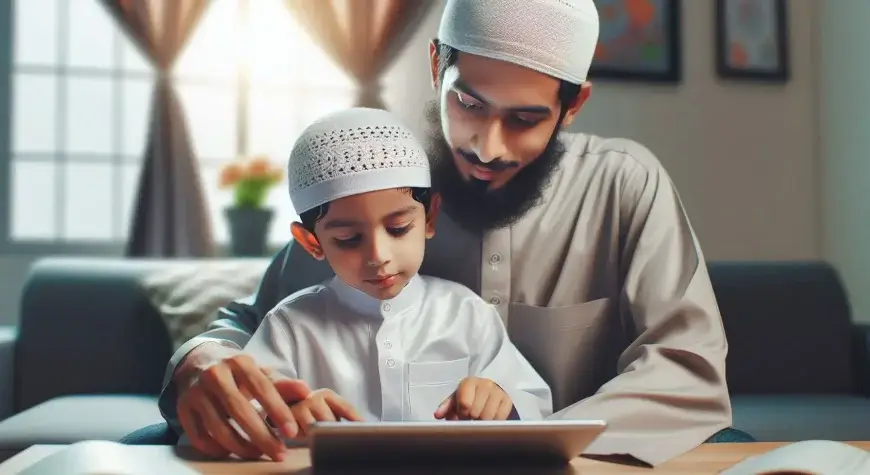The Critical Importance of Tarbiyah (Upbringing) in Islam

Tarbiyah in Islam encompasses the comprehensive nurturing of a child’s physical, emotional, spiritual, and intellectual development. Unlike mere education, it is an ongoing process that integrates Islamic values, teachings, and practices into daily life. Tarbiyah aims to cultivate a holistic personality aligned with the principles of Islam, ensuring that the child grows into a responsible, morally upright, and God-conscious individual.
The Role of Tarbiyah in Islamic Teachings
Islamic teachings emphasize the significance of Tarbiyah as a means to achieve success in both this life and the hereafter. It is a lifelong journey that begins from birth and continues through various stages of an individual’s life. The Prophet Muhammad (peace be upon him) highlighted the importance of upbringing, stating that parents are accountable for the moral and spiritual education of their children.
The Significance of Tarbiyah in Raising Righteous Children
Spiritual and Moral Development
The essence of Tarbiyah lies in fostering spiritual and moral development. Parents and guardians play a pivotal role in instilling faith (Iman) and Taqwa (God-consciousness) in their children. This involves teaching them about the core beliefs of Islam, the importance of worship, and the practice of good deeds.
Instilling Faith and Taqwa (God-consciousness)
A fundamental aspect of Tarbiyah is nurturing a deep sense of faith and Taqwa in children. This involves regular prayers, reading the Quran, and understanding its teachings. By embedding these practices into daily life, children develop a strong connection with Allah, which guides their actions and decisions.
Building Strong Character and Morals
Tarbiyah also focuses on building a robust moral character. Islamic upbringing teaches children the values of honesty, integrity, humility, and respect. These virtues are essential for personal development and contribute to the betterment of society as a whole.
Social and Emotional Development
Fostering Compassion and Empathy
Islamic upbringing emphasizes the development of compassion and empathy. By teaching children to be kind, considerate, and understanding towards others, parents help them build meaningful relationships and contribute positively to their communities.
Encouraging Social Responsibility
Another critical element of Tarbiyah is instilling a sense of social responsibility. Children are taught to be aware of their duties towards their family, neighbors, and society at large. This includes helping those in need, participating in community activities, and promoting justice and equality.
Responsibilities of Parents in Tarbiyah
Parental Role and Accountability in Islam
Parents hold a significant position in the process of Tarbiyah. Islam places great emphasis on the role of parents as the primary educators and moral guides for their children. They are accountable for ensuring that their children receive a proper Islamic upbringing.
Guardianship and Protection
Parents are entrusted with the guardianship and protection of their children. This involves not only providing for their physical needs but also safeguarding their spiritual and moral well-being. Islamic teachings encourage parents to create a safe and nurturing environment where children can thrive.
Provision and Care

Provision and care go beyond material needs. Parents are responsible for imparting knowledge, teaching good manners, and encouraging positive behavior. This holistic approach ensures that children grow up with a balanced perspective on life, grounded in Islamic values.
Quranic Guidance on Parental Duties

The Quran provides clear guidance on the responsibilities of parents. Several verses highlight the importance of nurturing children with care and wisdom.
Surah Luqman (31:13-19)
In Surah Luqman, verses 13-19, Luqman advises his son on the importance of monotheism, humility, and righteousness. These verses serve as a timeless reminder for parents to guide their children towards a path of piety and integrity.
Surah Al-Tahrim (66:6)
Surah Al-Tahrim emphasizes the duty of parents to protect their families from spiritual harm. It underscores the need for vigilance in maintaining an environment that promotes Islamic values.
Surah Al-Isra (17:23-24)
These verses command kindness and respect towards parents and highlight the reciprocal nature of parental and filial duties. They also stress the importance of prayer and gratitude, which are integral to the Tarbiyah process.
Hadith on Parenting and Upbringing
Key Hadiths
The sayings of the Prophet Muhammad (peace be upon him) offer profound insights into the principles of Tarbiyah.
“Each of you is a shepherd, and each of you is responsible for his flock…”
This hadith underscores the responsibility of every individual, particularly parents, in guiding and nurturing their dependents. It reinforces the concept of accountability and the importance of conscientious upbringing.
“The best of you are those who are best to their families…”
Another key hadith highlights the virtue of treating one’s family with kindness and compassion. It emphasizes that the quality of a person’s character is reflected in their behavior towards their family members.
Practical Approaches to Effective Tarbiyah
Creating an Islamic Environment at Home

An effective Tarbiyah begins at home. Parents can create an environment that reflects Islamic values through daily practices and rituals.
Daily Practices and Rituals
Incorporating daily prayers, Quranic recitation, and discussions about Islamic teachings into the family routine helps children internalize these values. Such practices also strengthen the family bond and create a sense of spiritual unity.
Importance of Islamic Education
Formal Islamic education plays a crucial role in Tarbiyah. Enrolling children in Islamic schools or supplementary classes ensures they receive structured knowledge about their faith. This complements the informal learning that takes place at home.
Positive Reinforcement and Discipline
Balancing love and discipline is essential for effective Tarbiyah. Positive reinforcement encourages good behavior, while fair and consistent discipline helps children understand the consequences of their actions.
Balancing Love and Discipline
An approach that combines affection with clear boundaries fosters a healthy and respectful relationship between parents and children. This balance helps children feel secure and valued, while also understanding the importance of discipline.
Role Modeling and Leading by Example
Parents serve as the primary role models for their children. Demonstrating good behavior, integrity, and adherence to Islamic principles in everyday life sets a powerful example for children to follow.
Challenges in Modern Parenting and Tarbiyah
Balancing Tradition and Modernity
One of the significant challenges in contemporary Tarbiyah is balancing traditional Islamic values with modern societal influences. Parents must navigate this delicate balance to ensure their children remain grounded in their faith while adapting to the changing world.
Navigating Cultural Influences
Cultural influences can sometimes conflict with Islamic teachings. Parents need to discern and prioritize Islamic values over cultural practices that may not align with their faith.
Addressing Digital Distractions
The digital age presents unique challenges in Tarbiyah. Parents must manage their children’s exposure to digital content, ensuring it aligns with Islamic values. This includes setting limits on screen time and guiding children towards beneficial and educational content.
Community and Educational Support
Role of Islamic Schools and Centers
Islamic schools and centers provide valuable support for parents in the Tarbiyah process. They offer structured education, spiritual guidance, and a sense of community, reinforcing the teachings and values imparted at home.
Importance of Community Engagement

Active involvement in the Muslim community enhances the effectiveness of Tarbiyah. It provides children with a broader network of role models and peers who share similar values, fostering a supportive and nurturing environment.
The Lifelong Impact of Tarbiyah
The effects of Tarbiyah extend beyond childhood. A well-rounded Islamic upbringing equips individuals with the tools they need to lead fulfilling and righteous lives. It also contributes to the development of a compassionate and just society.
Long-term Benefits for Children and Society
Children raised with a strong foundation in Tarbiyah are more likely to become responsible, ethical, and successful adults. They contribute positively to their communities and uphold the values of Islam in their personal and professional lives.
Final Thoughts on Emphasizing Tarbiyah in Parenting
Emphasizing Tarbiyah in parenting is crucial for nurturing the next generation of Muslims. By instilling Islamic values, fostering moral development, and encouraging social responsibility, parents can ensure their children grow into well-rounded and pious individuals.
References
Quranic Verses and Hadith
- Surah Luqman (31:13-19)
- Surah Al-Tahrim (66:6)
- Surah Al-Isra (17:23-24)
- “Each of you is a shepherd, and each of you is responsible for his flock…”
- “The best of you are those who are best to their families…”
Additional Reading and Resources
FAQs
What is the definition of Tarbiyah in Islam?
Tarbiyah in Islam refers to the comprehensive nurturing of a child’s physical, emotional, spiritual, and intellectual development, integrating Islamic values into daily life.
Why is Tarbiyah important in raising children?
Tarbiyah is crucial because it helps in developing a child’s faith, character, and social responsibility, ensuring they grow into righteous and morally upright individuals.
What are the responsibilities of parents in Tarbiyah?
Parents are responsible for providing a safe, nurturing environment, imparting Islamic knowledge, and teaching good manners and behavior.
How can parents balance love and discipline in Tarbiyah?
Parents can balance love and discipline by combining affection with clear boundaries, encouraging good behavior through positive reinforcement, and applying fair and consistent discipline.
What challenges do modern parents face in Tarbiyah?
Modern parents face challenges such as balancing traditional Islamic values with modern influences, navigating cultural conflicts, and managing digital distractions.
How does community support enhance Tarbiyah?
Community support enhances Tarbiyah by providing additional role models, educational resources, and a sense of belonging, reinforcing the values taught at home.

